Anchor: Difference between revisions
Appearance
| Line 5: | Line 5: | ||
== Buidling sport anchors == | == Buidling sport anchors == | ||
{{#invoke:FlexGallery|gallery | |||
|140px | |||
|File:stand_step1.png | |||
|Clip an HMS carabiner with an 120cm sling (1). | |||
|File:stand_step2.png | |||
|Orient the carabiner so its gravity-loaded (2) and screw its gate (3). | |||
|File:stand_step3.png | |||
|Clip your personal anchor (4) and screw its gate (5). | |||
|File:stand_step4.png | |||
|Clip a carabiner into the second bolt (6). | |||
|File:stand_step5.png | |||
|And gravity load it (7). | |||
|File:stand_step6.png | |||
|Make a [[clove hitch]] on the second carabiner using both strings (8). | |||
|File:stand_step7.png | |||
|Hang the sling end onto the second carabiner (9) and screw its gate (10). | |||
|File:stand_step8.png | |||
|Inspect the sling (11). | |||
|File:stand_step9.png | |||
|And inspect the gates (12). | |||
}} | |||
=== Risks === | === Risks === | ||
Revision as of 15:46, 20 September 2025
Anchor is a well-secured place from which climbers can belay and take rest between the pitches.
Pre-built anchors
TODO
Buidling sport anchors
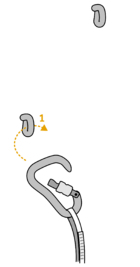
Clip an HMS carabiner with an 120cm sling (1). 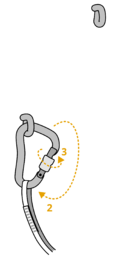
Orient the carabiner so its gravity-loaded (2) and screw its gate (3). 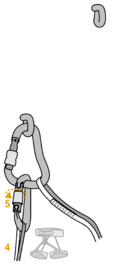
Clip your personal anchor (4) and screw its gate (5). 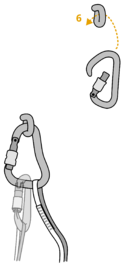
Clip a carabiner into the second bolt (6). 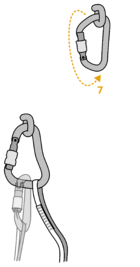
And gravity load it (7). 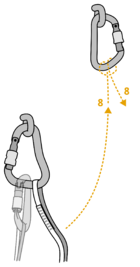
Make a clove hitch on the second carabiner using both strings (8). 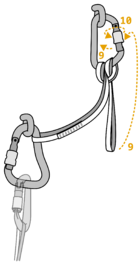
Hang the sling end onto the second carabiner (9) and screw its gate (10). 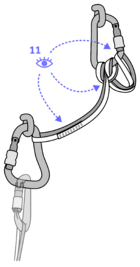
Inspect the sling (11). 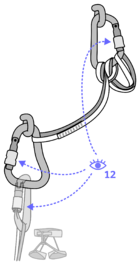
And inspect the gates (12).
Risks
Building trad anchors
TODO